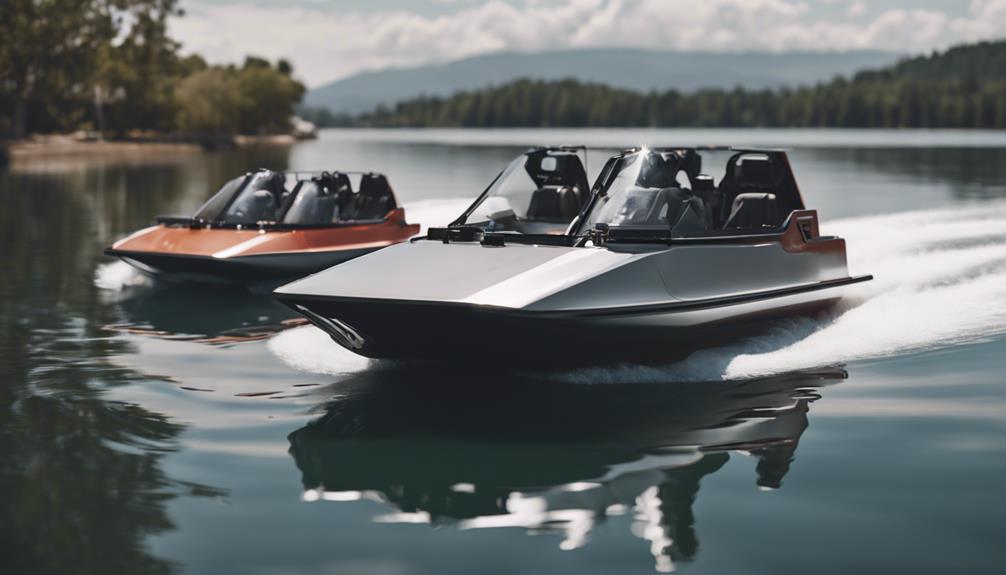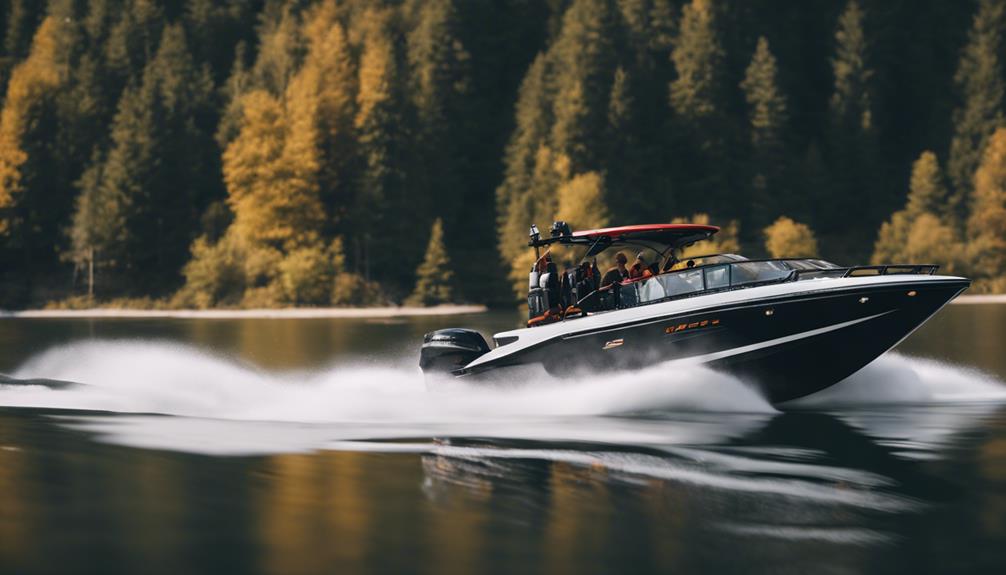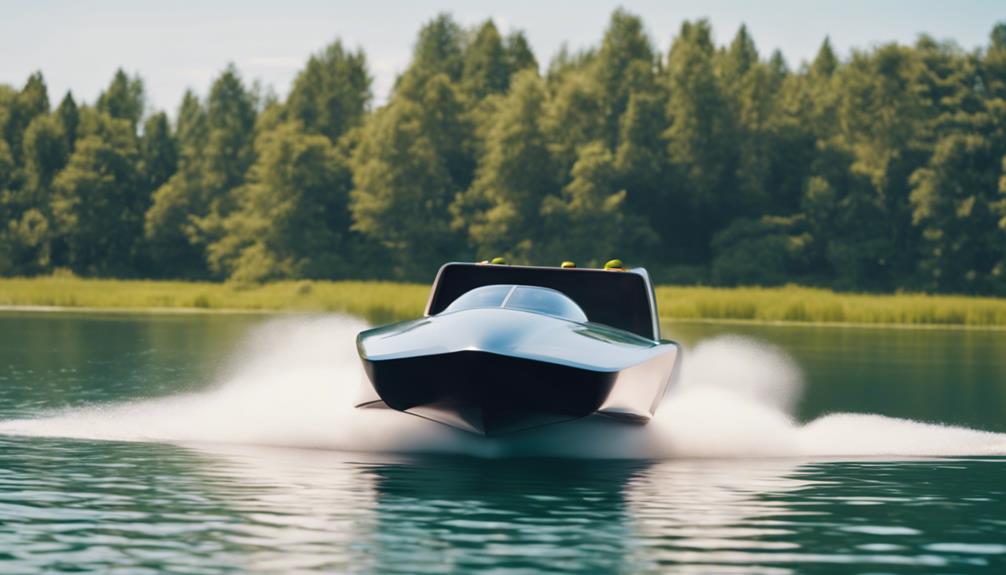Jet boats tend to be cheaper than traditional boats for a few key reasons. Their initial purchase price is generally lower, with quality models available for around $13-14k. There's also a high availability of used jet boats, which drives down resale values. Additionally, their simpler manufacturing processes help reduce costs. However, keep in mind that maintenance and fuel consumption can be higher, especially for 2-stroke engines. The competitive market, especially in spring, encourages sellers to offer aggressive pricing. If you're curious about the long-term implications and other factors that can affect your decision, there's more to explore.
Key Takeaways
- Jet boats generally have a lower initial purchase price, with quality models available for around $13-14k.
- Market saturation of used jet boats results in lower resale values, making them more affordable.
- Limited availability of specialized service for jet drives discourages some buyers, contributing to lower market prices.
- Higher maintenance and servicing costs, especially for 2-stroke engines, can deter buyers, impacting overall demand.
Factors Affecting Jet Boat Prices
When reflecting on the price of a jet boat, several key factors come into play that can considerably influence your budget. Jet boats often have a lower initial purchase price compared to larger boats, with quality models typically costing around $13-14k.
One significant factor is the seasonal demand, as prices tend to be more competitive in spring when buyers are actively looking for recreational options. You'll find that the market saturation of used jet boats also contributes to lower resale values, making them more accessible if you're budget-conscious.
Another factor to weigh is the type of engine models. Jet boats equipped with older or less popular engine models, like 2-stroke engines, might be cheaper due to potential reliability concerns. Additionally, the availability of specialized service for jet drives can be limited.
This lack of support can deter some buyers, which ultimately leads to lower market prices. By understanding these factors, you can make a more informed decision and potentially save money on your jet boat purchase.
Maintenance and Long-Term Costs

Maintaining a jet boat can get pricey due to the unique demands of its high RPM engine and the frequent need for repairs. Jet boats typically require more maintenance than traditional boats, especially if you have a 2-stroke engine. These engines generally need major servicing after 200-300 hours, which can inflate your ownership costs considerably.
Additionally, fuel consumption can soar to around $80 per hour during heavy use, further impacting your long-term operating expenses. The specialized nature of jet drives also complicates servicing, as finding skilled technicians and parts can be a challenge. This limited availability often leads to higher repair costs and downtime, which can be frustrating for owners.
You might also find sourcing parts for older models to be a hassle, adding to your long-term costs. All these factors contribute to a higher overall expense when it comes to jet boat maintenance.
While these boats might have a lower initial cost, the ongoing maintenance and repair demands can catch you off guard if you're not prepared for the financial commitment.
Performance and Efficiency Trade-offs

While the maintenance costs of jet boats can be steep, their performance advantages, such as quick acceleration and agility in shallow waters, often attract buyers looking for excitement on the water. However, you need to evaluate the trade-offs between performance and efficiency. Jet boats feature a jet drive system that enhances speed and maneuverability, but this often results in higher fuel costs and more frequent maintenance.
Here's a quick comparison to illustrate these trade-offs:
| Aspect | Jet Boats | Traditional Boats |
|---|---|---|
| Acceleration | Quick | Moderate |
| Fuel Efficiency | Lower | Higher |
| Maintenance Needs | More frequent | Less frequent |
With their shallow draft, jet boats can navigate in tighter spaces and shallow waters, making them ideal for adventurous outings. Yet, their high-RPM engines can lead to operating costs of up to $80/hour during heavy use. Inexperienced drivers may find maneuverability challenging at low speeds, which can be a deterrent and impact resale value. So, weigh your options carefully before diving in!
Market Demand and Availability

The market for jet boats is highly competitive, driven by an abundance of used models and seasonal demand shifts that influence pricing. You'll find that the high availability of used jet boats leads to competitive pricing, which can greatly depress resale values. Many buyers treat jet boats as second or starter boats, resulting in quicker resale cycles that further lower prices.
Seasonal demand plays an essential role, too. Most jet boats are sold in the spring, which creates a surge in availability just when everyone's keen to hit the water. This influx can lead to more aggressive pricing strategies as sellers try to stand out. Additionally, initial excitement around purchasing a jet boat often fades quickly, prompting owners to sell shortly after buying.
Ownership costs, including higher fuel consumption and maintenance challenges, also dissuade some buyers. These factors contribute to a more competitive market for jet boats, where affordability becomes a key selling point.
Comparisons With Traditional Boats

Jet boats often offer a more budget-friendly option than traditional boats, especially when comparing similar sizes and features. When you look at the initial purchase price, you'll find that quality jet boats can be found for around $13-14k, making them accessible for many buyers. Here's why they stand out:
- Simpler drive systems reduce manufacturing costs
- Increased availability of affordable used models
- Lower initial purchase prices than traditional boats
- Market saturation leads to higher depreciation rates
While it's true that jet boats might have higher fuel consumption, their lower initial costs can balance out long-term expenses for recreational use. Plus, the resale value of jet boats tends to be lower due to the abundance of used options, making them a smart choice for first-time buyers or those looking to upgrade.
You get a versatile watercraft without breaking the bank, which is especially appealing when you consider how much you can save upfront compared to traditional boats. So, if you're on a budget, a jet boat could be the perfect fit for your boating adventures.
Frequently Asked Questions
What Are the Downsides of Jet Boats?
Jet boats can be noisy, hard to handle at low speeds, and their engines wear out faster, leading to costly repairs. You might also struggle to find specialized service when maintenance issues arise.
What Is the Benefit of a Jet Boat Vs Prop?
Imagine cruising through a modern-day river with unparalleled agility; jet boats offer superior acceleration, shallow draft capabilities, and enhanced safety for swimmers. You'll enjoy a sportier ride and better maneuverability without worrying about exposed propellers.
Why Do People Buy Jet Boats?
You buy jet boats for their versatility, allowing you to navigate shallow waters and access hidden lakes. Their sporty performance and quick acceleration make them perfect for thrilling adventures and family fun on the water.
Are Jet Boats Difficult to Maintain?
Yes, jet boats can be difficult to maintain. You'll need to perform regular inspections, clean the jet system thoroughly, and pay attention to engine care. Finding specialized service can also be a challenge for you.
What are the potential cost savings and benefits of owning a jet boat compared to other types of boats?
Owning a jet boat can offer the ultimate benefits of jet boats compared to other boats. With their advanced propulsion system, jet boats require less maintenance and are more fuel-efficient, resulting in potential cost savings over time. Additionally, jet boats are known for their agility and ability to navigate shallow waters, providing unique recreational opportunities.
Conclusion
In the world of boating, jet boats often stand out as a more budget-friendly choice, yet they come with their own set of compromises.
While you might save upfront, consider the long-term maintenance costs that could arise.
Similarly, their performance mightn't match that of traditional boats, despite their sleek design and maneuverability.
Ultimately, weighing the immediate savings against potential future expenses can guide you to the right decision for your aquatic adventures.










